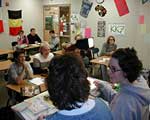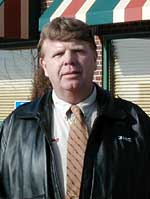By Rob Schmitz
Minnesota Public Radio
January 11, 2002
|
| RealAudio |
As the new year begins, residents of Albert Lea are doing their best to put 2001 behind them. The year has been a tough one for this southern Minnesota community. In July, the Farmland Foods plant, the city's third largest employer, burned down. The disaster left almost 500 residents unemployed. Then, in November, city residents voted down a proposed school levy referendum, forcing its school district to make more than $1 million worth of cuts. The city's population is declining, and businesses are leaving the city.
| |
|
|
|
||
French teacher Mindy Christian is thinking about what she's going to miss about her job.
"I'll really miss interaction with the students and watching their language abilities grow. That's been great for me," says Christian. "And not being able to see the kids abroad."
Christian has taught at Albert Lea High School for four years. Before coming here, she taught French in Purham, but she lost her job when the school district there eliminated the French program.
Now, history is repeating itself. The school district will cut the high school French program to reduce its budget, and Christian is out of a job again. The program is one of many being eliminated or cut back after area voters rejected a proposed levy referendum.
The rejected referendum is the most recent in a string of setbacks for Albert Lea. In July, the Farmland Foods plant, the city's third largest employer, burned down. The disaster left nearly 500 residents without jobs, accelerating an already declining population.
"We're glad 2001 is over with, I'll put it that way," says Dave Prescott, superintendent of Albert Lea schools. He says he and other educators were surprised the referendum proposal failed.
Prior to election day, the school district polled all parents and staff in the district. The results showed that 5,000 to 7,000 voters would support the referendum. But on election day, only 2,700 voted yes.
| |
|
|
|
||
Prescott thinks there are many reasons the referendum failed. Just five years ago, Albert Lea residents approved money for a new high school, which opened its doors last year. Prescott says some voters may have thought money from that project could have helped the problems the district faces now.
Prescott also thinks the Farmland Fire, the economic recession, and the events of Sept. 11 contributed to citizens' reluctance to invest more money in their school district.
But Prescott says Gov. Jesse Ventura's criticism of school levy requests was the primary reason.
"I think when your state leadership is telling you one thing, no matter what you think of the leadership, the state leadership definitely sets the tone," says Prescott.
But a local businessman contributed to the defeat as well. In the days leading up to the election, Mal Prinzing spent $10,000 for a billboard - and for an airplane to carry a banner over the town - urging Albert Lea citizens to vote "no."
Prinzing owns strip clubs and adult video stores throughout Minnesota and two other states. He is also the head of an organization called Taxpayers Against Political Stupidity, or TAPS. Prinzing says the district didn't need a new high school because the student enrollment is declining.
He claims the district built the new school on land zoned for commercial and industrial development, which he claims took land away from businesses who would have stimulated the area's failing economy.
| |
|
|
|
||
State Rep. Dan Dorman, R-Albert Lea, refutes Prinzing's claim, saying the high school was built on land the district had owned for more than 20 years. Dorman supported the levy referendum.
He says schools are facing short-term problems. But even in the long run, the schools will face an uphill battle as businesses choose to locate across the border, especially in Iowa.
Iowa's commercial and industrial tax rates are lower than Minnesota's, making it a more attractive site to locate a business.
"If you compare Mason City, Iowa to Albert Lea, and you take a look at those communities 20 years ago and you take a look at them today, you'll see (Mason City is) growing and prospering," Dorman says. "I think the Minnesota state tax policy has a lot to do with that."
Dorman says commercial and industrial tax rates in rural Minnesota are second-highest of any rural area in the country. He says that's driven businesses away and hurt rural communities and schools.
Despite Albert Lea's setbacks, Dorman remains optimistic. He says the tax bills passed in the last three years have given more incentives for businesses to invest in a city like Albert Lea. He hopes that this will lead to a future investment in Albert Lea's schools.
In the meantime, citizens in Albert Lea are gathering signatures for a petition to place a new referendum proposal on next year's ballot.
More from MPR


